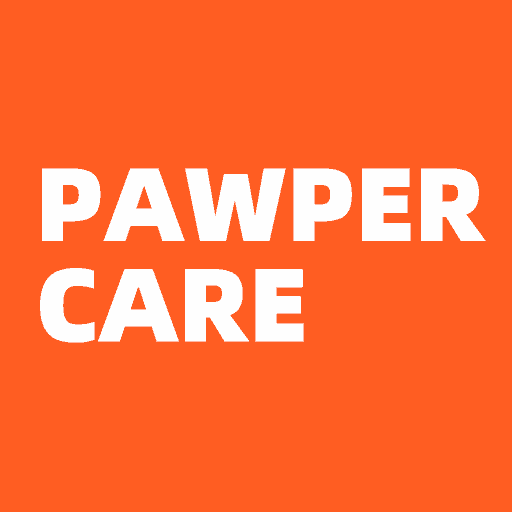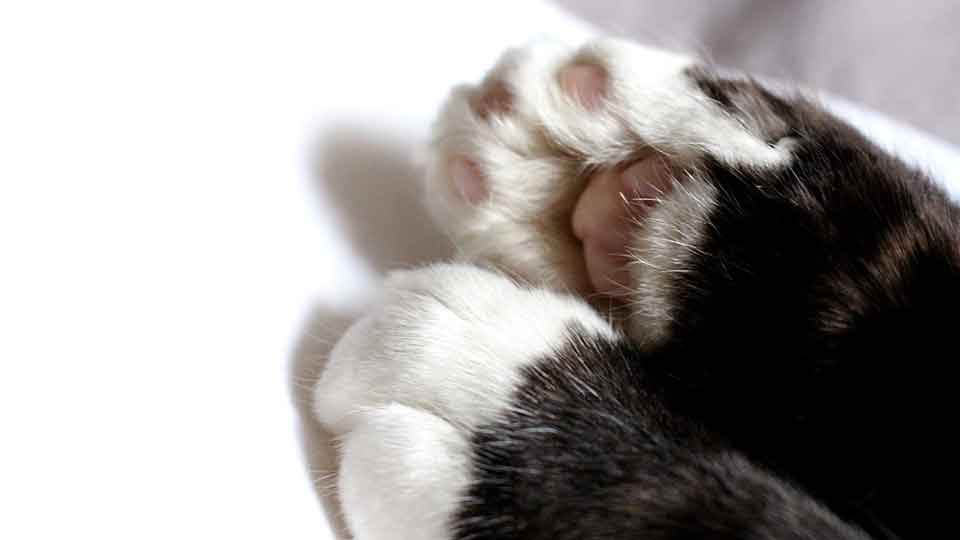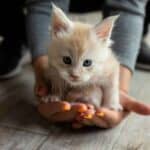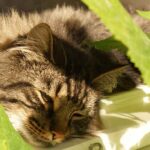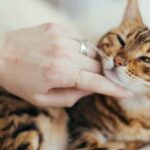When cats scratch and damage the furniture, some people start thinking about declawing their cats.
But what is declawing?
Declawing is a surgical procedure that removes a cat’s claws by cutting off the last bone of each toe. It is also called onychectomy.
Declawing can have negative effects on the cat’s health and behavior. Declawing can cause pain, infection, nerve damage, arthritis, and behavioral problems such as biting, litter box avoidance, and aggression.
Declawing is considered an act of animal cruelty in many countries and is therefore banned or restricted in some places.
In this post, I will explain why some people do it and the pros and cons of declawing an indoor Maine Coon.
I will also share some alternatives to declawing that can help you and your cat live in harmony without resorting to this drastic measure.
Do You Need To Declaw A Cat?
The answer is no. You do not need to declaw a cat.
Declawing is not a necessary or beneficial for cats and can cause more harm than good.
Declawing can cause pain, infection, bleeding, lameness, nerve damage, bone spurs, arthritis, behavioral problems, and reduced quality of life for cats.
Declawing also deprives cats of their natural means of defense, communication, and expression.
Cats use their claws for scratching, marking their territory, stretching their muscles, balancing their bodies, and playing with other cats or toys.
Without their claws, cats may feel vulnerable, insecure, and frustrated.
Declawing is not recommended by most veterinarians and animal welfare organizations, such as the American Veterinary Medical Association (AVMA), the American Association of Feline Practitioners (AAFP), the Humane Society of the United States (HSUS), and the ASPCA.
They advise against declawing unless it is medically necessary for the cat’s health, such as in cases of severe trauma or infection.
Is Declawing Illegal?
Declawing is not illegal in most countries and states, but it is highly regulated and discouraged.
Some countries and regions have banned or restricted declawing for ethical reasons, such as the United Kingdom, Australia, New Zealand, Israel, Brazil, and most of Europe.
In 2019, New York became the first state in the United States to outlaw declawing for non-medical reasons.
Other states and cities are considering similar legislation to protect cats from this cruel practice.
Why Do People Declaw Their Cats?
Some people may choose to declaw their cats for various reasons, such as:
• To prevent scratching damage to furniture, carpets, curtains, or other household items.
• To protect themselves or their family members from scratches or injuries caused by playful or aggressive cats.
• To avoid potential allergies or infections from cat scratches.
• To comply with landlord or housing policies that require declawed cats.
• To follow cultural or personal beliefs that consider declawed cats more desirable or hygienic.
However, these reasons are invalid or justified enough to justify the risks and consequences of declawing.
There are better ways to address these issues without harming your cat or compromising their well-being.
Pros and Cons of Declawing An Indoor Maine Coon
Maine Coon’s Paw vs Human Hand
As I said before, some Maine Coon owners may think that declawing their indoor cats is a good idea to prevent them from scratching their furniture or hurting themselves or others.
However, declawing an indoor Maine Coon can affect their physical and mental health in many ways.
Here are some of the pros and cons of declawing an indoor Maine Coon:
Pros
• It may reduce scratching damage to household items.
• It may reduce the risk of scratches or injuries to humans or other pets.
• It may reduce the need for regular nail trimming or grooming.
• It may make litter box maintenance easier.
Cons
• It can cause severe pain and discomfort during and after the surgery.
• It can cause complications such as infection, bleeding, swelling, lameness, nerve damage, bone spurs, and arthritis.
• It can change the way the catwalks and balances its body.
• It can affect the cat’s ability to climb, jump, play, and hunt.
• It can alter the cat’s natural behavior and personality
• It can increase the cat’s stress levels and anxiety
• It can lead to behavioral problems such as biting, aggression, litter box avoidance, or depression.
• It can reduce the cat’s quality of life and happiness.
As you can see, the cons of declawing an indoor Maine Coon outweigh the pros by far.
Declawing is not a solution, but a problem.
It can harm your cat in many ways and make them less happy and healthy. It can also damage your relationship with your cat, making them less trusting and affectionate.
What Are the Alternatives To Declawing Cats?
If you are thinking of declawing your Maine Coon cat, please reconsider. Many alternatives to declawing can help you and your cat coexist peacefully without resorting to this cruel and unnecessary procedure.
Here are some of the alternatives to declawing cats:
• Provide your cat with appropriate scratching posts, pads, or mats that they can use to satisfy their scratching needs.
Place them strategically where your cat likes to scratch, such as near windows, doors, or furniture. You can also spray them with catnip or other attractants to encourage your cat to use them.
• Trim your cat’s nails regularly to keep them short and blunt.
You can use a nail clipper or a file designed for cats, or ask your veterinarian or groomer to do it for you. Be careful not to cut too close to the quick, the pink part of the nail that contains blood vessels and nerves. If you are unsure how to do it, ask for a demonstration from a professional.
• Use nail caps or covers that fit over your cat’s claws and prevent them from scratching.
They are made of soft plastic or vinyl and come in different sizes and colors. You can apply them yourself or by a veterinarian or groomer. They usually last for four to six weeks before they fall off naturally or need to be replaced.
• Train your cat to stop scratching inappropriate items using positive reinforcement and redirection.
Praise and reward your cat when they scratch their designated posts or pads, and gently move them away from the items they are not supposed to scratch.
You can also use deterrents such as double-sided tape, aluminum foil, or citrus spray to make the items less appealing to your cat.
• Provide your cat with enough physical and mental stimulation to keep them busy and happy.
Play with your cat regularly using toys that mimic their natural prey, such as feathers, mice, or balls.
Provide them with interactive toys they can play with independently, such as puzzles, treat dispensers, or tunnels. Give them access to windows, perches, or cat trees where they can watch birds or other animals outside.
• Spay or neuter your cat to reduce their urge to mark their territory with their claws.
This can also prevent unwanted pregnancies, reduce roaming behavior, and lower the risk of certain diseases and cancers.
• Consult with your veterinarian if your cat is scratching excessively or abnormally.
This could be a sign of a medical condition such as allergies, parasites, fungal infections, or stress. Your veterinarian can diagnose and treat the underlying cause and recommend appropriate solutions.
Final Thoughts
In a word, declawing is a controversial and often misunderstood procedure that involves removing the claws and the bones that attach them to the cat’s toes.
It is not a simple nail trim but a major surgery that can affect your cat’s health and behavior. It is not a humane or necessary procedure for cats, especially for indoor Maine Coon cats.
It can cause your cat many physical and psychological problems, affecting their well-being and happiness.
Many alternatives to declawing can help you and your cat live in harmony without harming or compromising their natural behavior.
If you love your Maine Coon cat, please do not declaw them.
Instead, provide them with the proper care, attention, and enrichment they deserve. They will thank you for it with their love and loyalty.
